The crows had eaten her eyes by the time we found her. Splayed on the road’s shoulder, the agile wallaby is about the size of a small labrador. There’s no blood, aside from the empty eye sockets, and her body is cool as I grasp her tail and drag her into the grass.
Then I notice her distended stomach and two small paws peeking out from the opening of her pouch. I kneel down and tickle one of the paws with my index finger. The pouch moves, soft fur undulating as the joey within squirms with life.
Oh god. It’s alive. And I’m hundreds of kilometers from the nearest wildlife carer. I tickle the paw again, just to be sure. Another ripple, stronger this time, and the paw curls back into the pouch.
Like deer in eastern North America, macropod roadkill is ubiquitous along Australian roads. Over the years I’ve checked the pouches of dozens of road-killed kangaroos and wallabies, looking to see if the joeys within survived the collision. Most are bloated and buzzing with flies by the time I find them, their offspring long since perished.
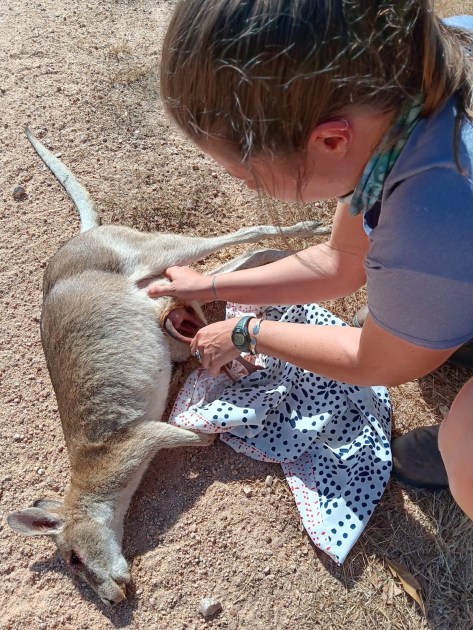
It’s a slow, gruesome death. The joeys die of dehydration as their mother’s corpse rots around them, scavenged by maggots and wedge-tailed eagles. That’s if the dingos don’t find them first, or another car doesn’t clip the carcass and finish them off quickly.
This is the first joey I’ve found alive, and I’m wildly unprepared. All I know about rescuing roadkill boils down to two rules: Always check the pouch, and always bring a spare pillowcase. After that, I have no idea what to do.
I hurry back to my car to fish a pillowcase out of the trunk, filthy from two weeks of camping in the remote Cape York Peninsula. Arranging the opening near the dead wallaby, I prise her pouch open with one hand and reach my other hand inside, feeling for the joey’s haunches and tail.
The little one huffs at me in distress — half hiss, half grunt — as I gently work him out, bum first. He’s a jumble of legs and tail, scrabbling to stay inside his mother. Thankfully his cries of distress force him to release his hold on her nipple, so I don’t have to cut him free.
His head emerges last, jet-black eyes staring wildly in terror at what must feel like an alien abduction. I shove him into the pillowcase and shuffle back to the car. He’s warm and there’s no obvious blood, both very good signs. And he’s alert and kicking, also very good.
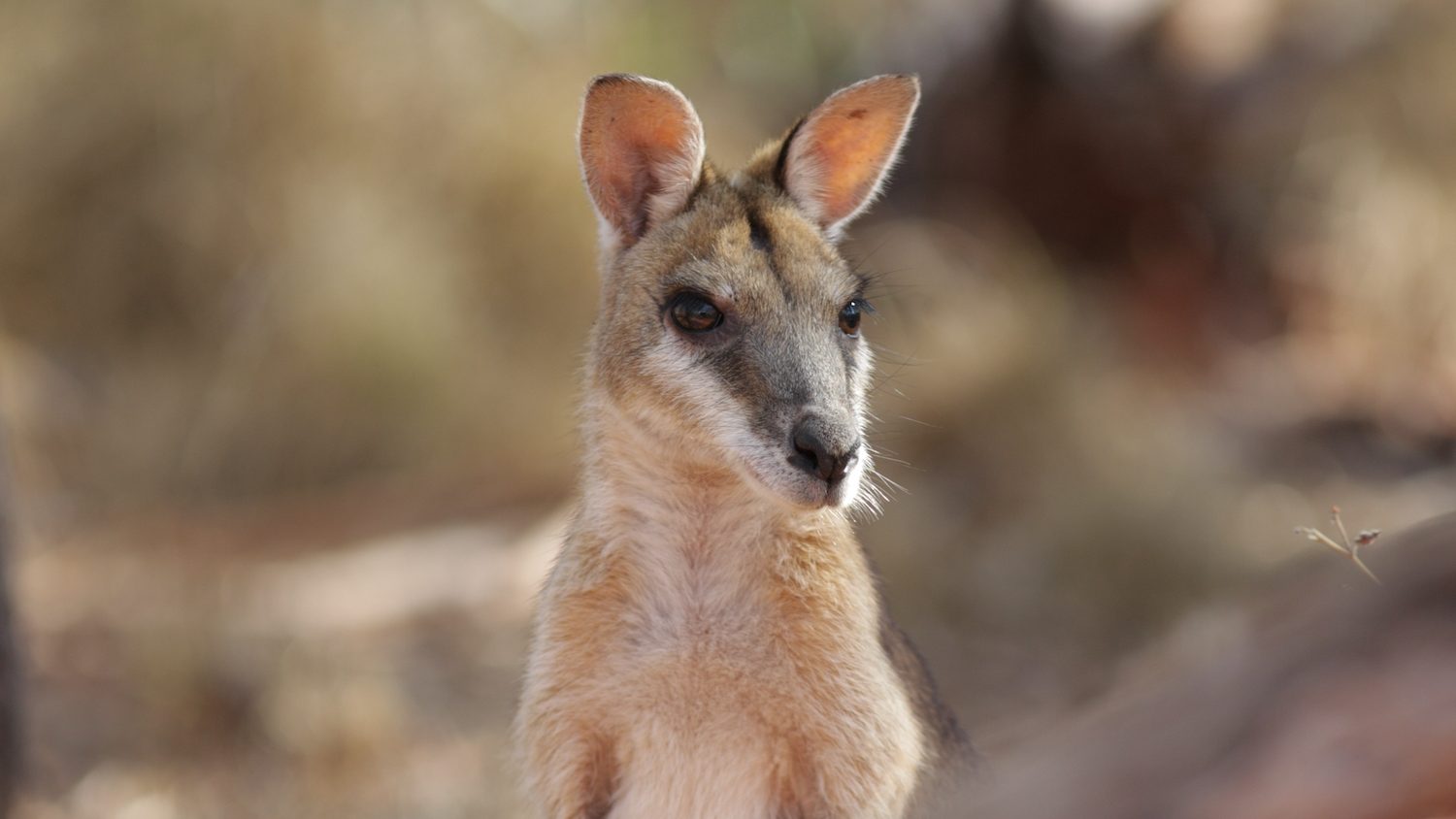
I clutch the pillowcase to my chest as my partner turns the car around and speeds back to Artemis Station, where we’d camped the previous evening. I’m friends with an ecologist who works at the cattle property — a stronghold for the endangered golden-shouldered parrot — and thankfully he has the number of a wildlife carer.
Via phone, the carer walks me through a quick injury check to make sure the joey doesn’t have any serious trauma, like a broken leg or tail. Then we make a plan for the next 24 hours. She’s located a day’s drive south, and I’ll need to care for him until we can reach her.
My first concern is food, but the carer tells me that even if I had formula, he’s too stressed to digest anything. For now, I should try to keep him calm and get him to drink some water. I’ll also have to keep him warm overnight; he doesn’t have fur yet, just a layer of soft velvet fuzz, so he can’t regulate his body temperature. “You’re not going to get any sleep,” she tells me, laughing.
A few hours later, the little joey has finally stopped squirming and is asleep down the front of my tank top. We’ve named him Dixie — after the road where he was found — and every so often he peeks his head out, looking around inquisitively at this strange new world.
Now that he’s calm, I try to get him to drink. I cup water in my palm and press it to his nose, which results in sneezing fit. Used to sucking on a nipple, he doesn’t yet know how to lap liquids. Undeterred, I pull out the small syringe I use for fountain pen ink, fill it with sterilized water, and slowly drip the liquid onto his upturned snout. After a few tries he gets the hand of it, slowly licking each drop.
After a few somersaults, he gets comfortable and dozes off again, hind feet poking out beneath my chin. We drive on, slowly making our way towards Cairns along the wide, red-dirt road that runs south through the Cape’s grasslands.
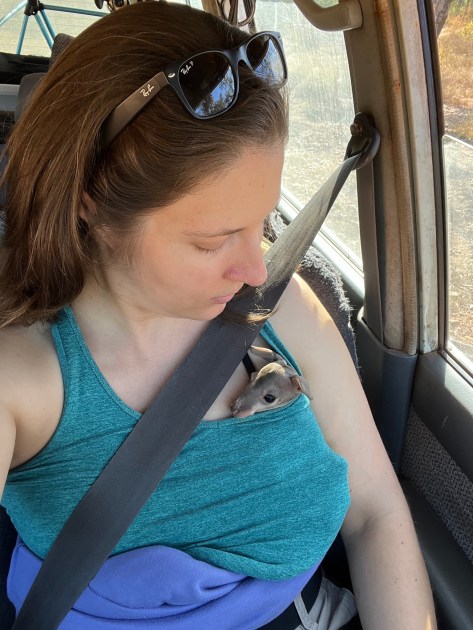
That evening we camp by the banks of the Morehead River, setting up well back from the water’s edge to avoid crocodiles. Night brings a new challenge: How to sleep with a small creature who needs to stay warm but also won’t stop wiggling?
After trial and error, I curl on my side and tuck Dixie between my stomach and thighs. He dozes off and on, waking every few hours in distress, huffing furiously and trying to crawl out of the pillowcase. I shove him back down my shirt and he snuffles against my skin, searching for food.
It’s here I should mention that I’ve never been a particularly maternal person. As a child, I played with toy animals instead of dolls and cared for my neighbor’s pets instead of babysitting. I’m awkward around small children and I hold babies like they’re a bomb that will explode if I make any sudden movements. And I’ve never once cooed over a newborn wishing it were my own.
Yet holding this velvet-soft joey against my chest feels as natural as breathing. It’s not long before I can read his body language: sensing when he’s calm and curious, when his squirms indicate stress or just an attempt to get comfortable for the next nap. As his little paws search my skin hungrily, my gut clenches with guilt that I can’t feed him. Soon, little one. Soon.
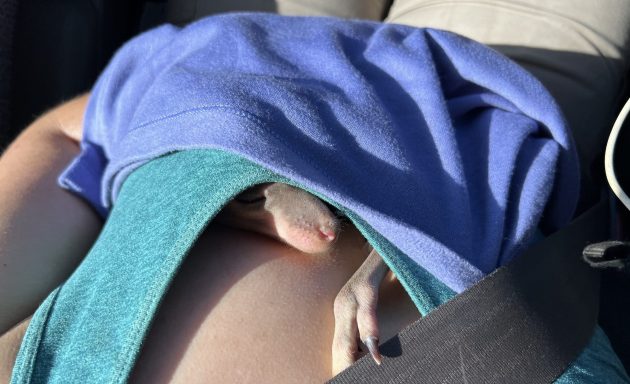
I’m awake at dawn, Dixie strapped against my chest for warmth as I make tea and pack up camp. He’s exhausted from stress and hunger, but we’ll be at the carer’s house by mid-day. The road turns from dirt to pavement, cattle stations giving way to farmland and small towns as we get closer to Cairns.
Donate Now to Protect Nature
Help protect threatened lands and waters around the globe.
The carer, Lucy, is waiting for us when we arrive. She mixes up a special macropod formula — designed for kangaroos, wallabies, and pademelons — and then warms the bottle, giving me pointers on how to repeat the process if I find another little rescue in a remote area.
I hold Dixie like a newborn, and Lucy shows me how to gently shield his eyes, as if he were still in a dark pouch, and then wedge his jaws open with my fingertips to slide the long rubber nipple over his tongue.
Tasting the first drops of formula, he latches down and begins sucking greedily, tiny paws grasping either side of the bottle. Before long he burps, spitting up the last mouthful of milk on his chin. I wipe it away, and his little eyelids flutter as he slides into a milk-drunk stupor.
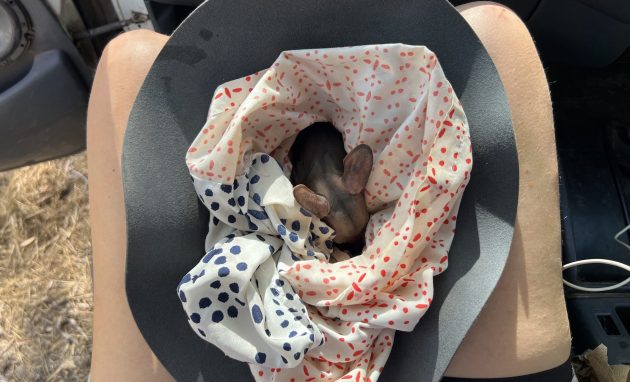
Relief washes over me for the first time since I pulled him from his mother’s pouch. He’s going to be okay.
All too soon, it’s time to say goodbye. I’ve been a surrogate mother to this little orphan for 24 hours, and I’m loathe to leave him. I’ll miss those dark, liquid eyes gazing back into mine, his curious nuzzles, and nervous huffs. But I’ve done my job, getting him to an experienced wildlife carer who will raise him for the next five months before soft-releasing him back into the wild.
I give his velvet-soft forehead a final rub as I hand him over to Lucy. Goodbye, little one. And good luck.
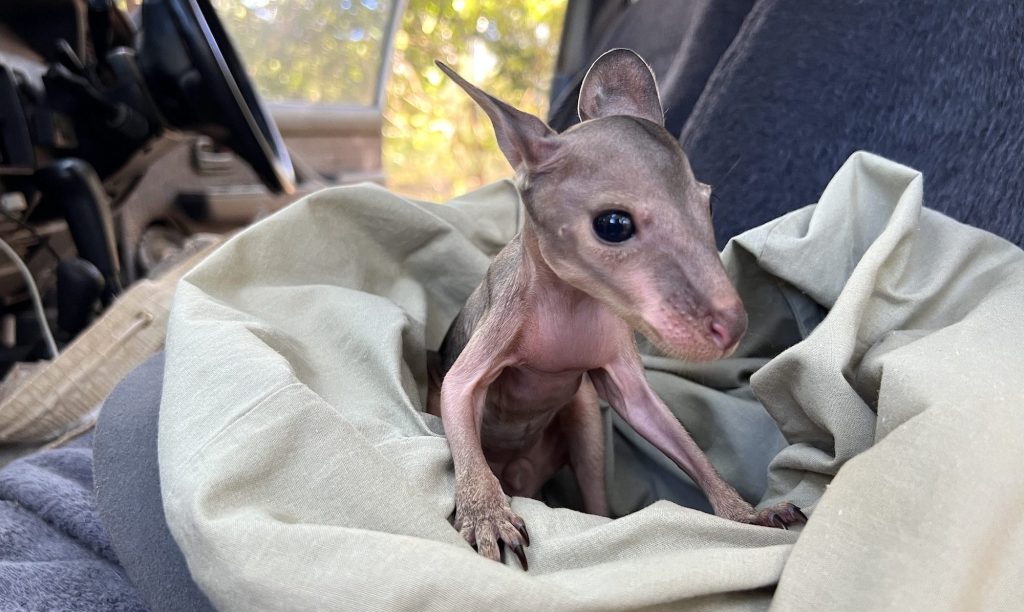



This is a wonderful example of how much good just one person can do for other species that suffer due to our negative impacts on Earth. We need to be ever more vigilant and understanding of other species and increasingly push to help protect the basic right to live and ability to thrive for all native species.
Kudos to Justine
What a lovely story! I needed that this morning :). I’m so thankful that there are other animal lovers out there who will go out of their way to help when they see it is needed. You are wonderful!
Thank you for sharing your success story and photos, very touching!
A very fortunate little one
Lovely rescue story. I enjoyed your excellent descriptions. Felt like I was there. Thanks.
Diana
Beautiful experience
One fortunate little one